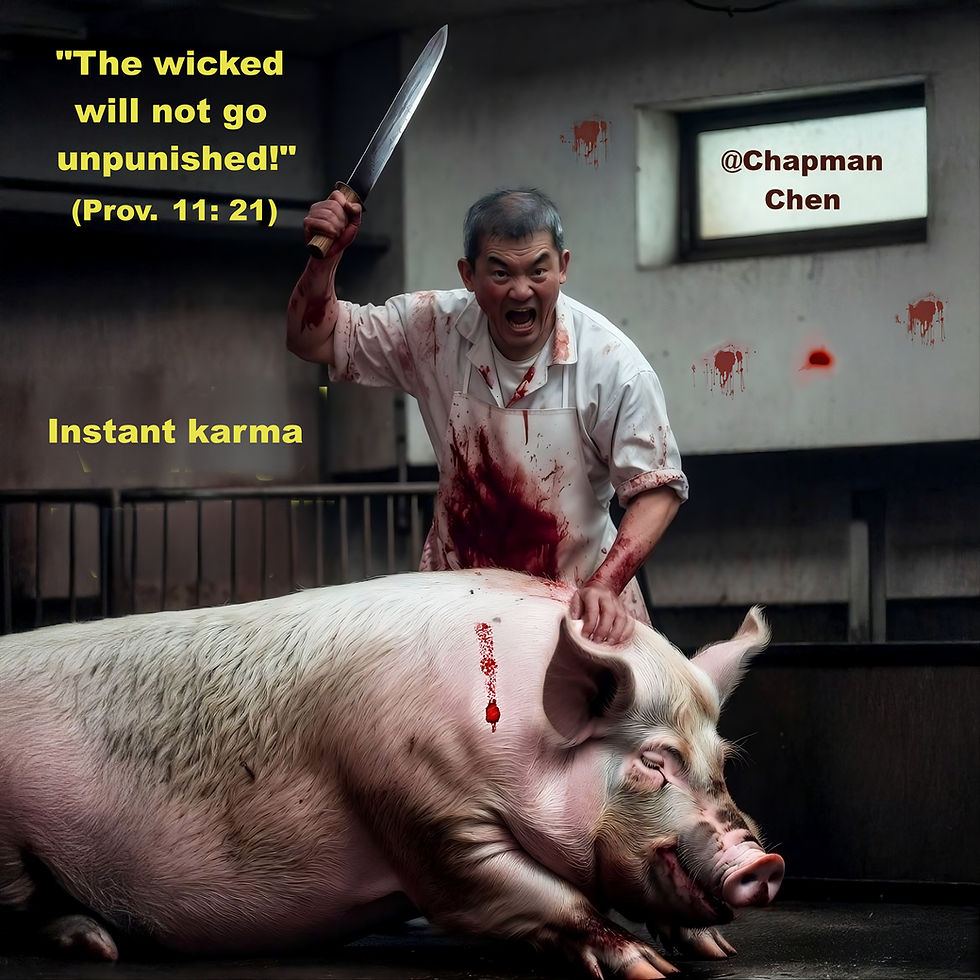“Dominion” in Genesis 1:28 Means Serving the Animals. By Dr Chapman Chen
- Chapman Chen

- Oct 6, 2025
- 3 min read

Many anti-vegan theologians, such as St Augustine (The City of God), Martin Luther (Luther’s Works, 2:132), and Karl Barth (Church Dogmatics, Vol. III/4), have quoted Genesis 1:26 and 1:28 to justify animal exploitation—(ab)using animals for food, clothing, experiments, and entertainment. They contend that the verbs subdue and have dominion therein mean treading down animals and exercising lordship over them.
1. “Dominion” = Stewardship?
Some modern theologians, such as Andrew Linzey (1995: 34, 45, 57) and Stephen Webb (2001: 13), argue that “dominion” signifies responsible stewardship; yet even they interpret it as implying human superiority over other animals. And humans, in general, tend to abuse whatever power they think they have over others (cf. Acton 1887).
2. Conscientious Omnivorism?
Animal theologian David Clough, for one, argues that it is acceptable for humans to be “conscientious omnivores” (Clough 2016, 7), provided that “the animals concerned have been given a good life,” for such use of them supposedly “respects their relationship to us as fellow creatures of God” (Clough 2016, 2). There is, however, nothing “conscientious” or “respectful” about consuming God’s innocent creatures who don’t want to die, however “well” they may be treated while kept as slaves. Clough’s internal contradiction arises precisely from his anthropocentric reading of dominion (Gen 1:26, 28). He writes that “humans have a distinctive calling to image God in a particular human way” (Clough 2015), specifically in relation to other animals (Clough 2012, 166), and he ties this vocation to the notions of dominion and stewardship (Clough 2015).
3. To Dress and to Keep the Earth
Admittedly, kabash, the Hebrew word for subdue in Genesis 1:28, does mean “subjugate” or “trample.” In my submission, however, this word should be interpreted contextually. The best method for determining its meaning is to examine how humans were supposed to carry out the Lord’s command to “subdue” the earth (cf. Stead 2019). For example, in Genesis 2:15 (KJV), God instructs the first humans to “dress” the earth and to “keep” it. The Hebrew term for “dress” is עָבַד (ʿābad), which, according to Strong’s Concordance, means “to work” or “to serve”; and that for “keep” is שָׁמַר (šāmar), meaning “to watch” or “to preserve.” Hence, “subdue” in Genesis 1:28 must signify careful cultivation—not brutalising other sentient creatures or damaging the environment for selfish human purposes.
4. “Dominion” (Yirdu) as Servanthood
Even more importantly, dominion in Genesis 1:26 and 1:28 should be understood not as human authority over animals but as servanthood, in the compassionate spirit of Jesus Christ. The ancient, pre-Masoretic Hebrew consonantal form of “dominion” is ירדו (yirdu), which can be read either as רָדָה (rādāh, “to subjugate”) or יָרַד (yārad, “to lower oneself”) (cf. Ehrenfeld and Bentley 1985: 301). I maintain that only yārad provides the correct interpretation, for two major reasons.
First, Jesus declares that he “came to serve, not to be served” (Matt. 20:28) and teaches that “anyone who wants to be first must be the very last, and the servant of all” (Mark 9:35).
Second, the command to “have dominion” (Gen. 1:28) is immediately followed by God’s prescription of a vegan diet for humanity (Gen. 1:29) (cf. Linzey 1995: 34). On this basis, Linzey argues that “dominion” means stewardship rather than despotism, and further contends that humanity has the unique potential to become the “servant species,” working with God for the liberation of animals (Linzey 1995: 34, 45, 57).
5. Serve the Animals as Humble Waiters
Therefore, to “subdue” the earth means to care for it as an unassuming gardener, and to “have dominion over animals” signifies God’s command that humanity lower themselves and serve other animals as humble waiters, not act as God-like rulers (Chen 2024). #VeganChrist #VeganGod #VeganTheology #VeganChurch





Comments